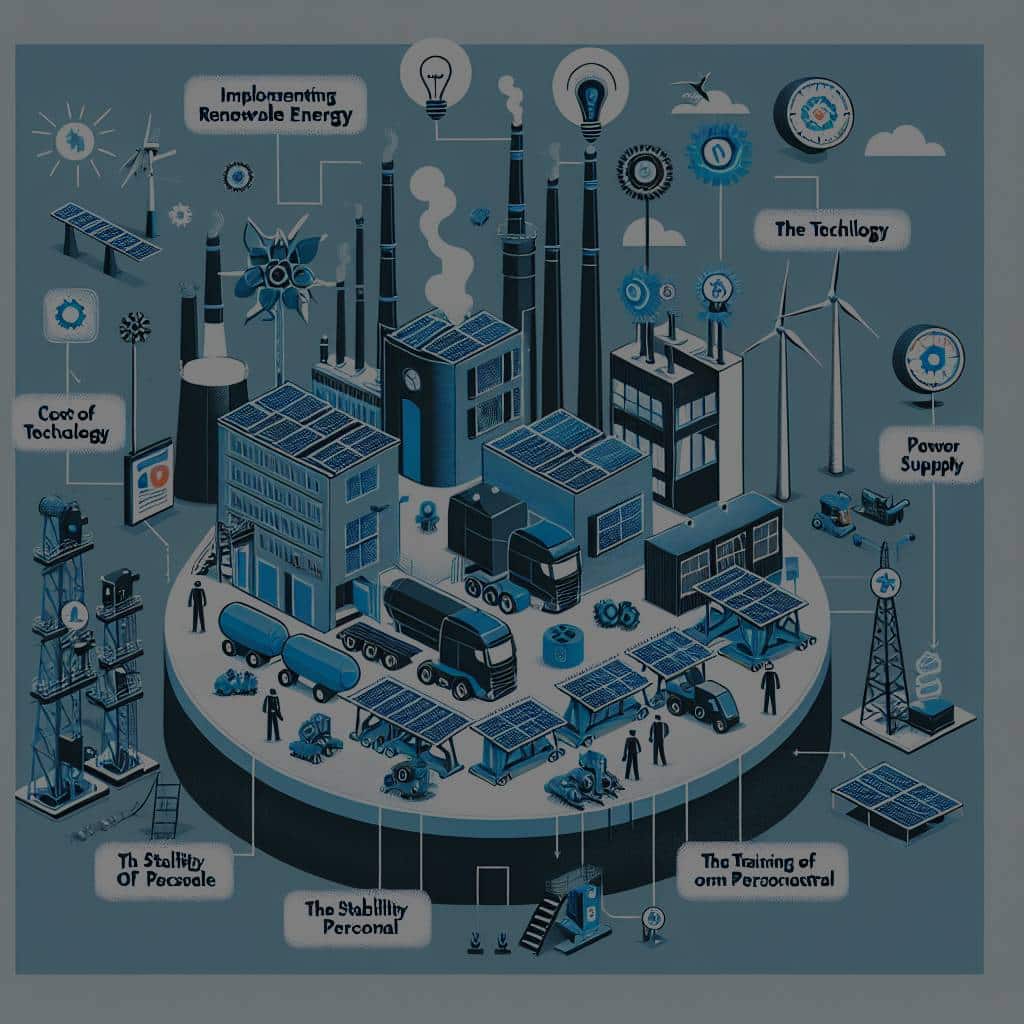What Are the Challenges of Implementing Renewable Energy Solutions in UK Manufacturing?

The narrative around energy use is rapidly evolving, and renewable sources such as wind and solar are being looked at with renewed interest. Coupled with the growing awareness of the environmental harm caused by fossil fuels, the shift towards renewables is becoming a global phenomenon. However, the road to a fully renewable energy-powered industry is not without its challenges. In this in-depth article, we’ll explore the barriers and challenges to implementing renewable energy solutions in the UK’s manufacturing sector.
The Economic Cost and Technological Challenges
Even though renewable energy technologies have made significant strides over the past couple of decades, they are still not as cost-effective or efficient as traditional fossil fuels. This economic disadvantage presents a considerable hurdle for industries, particularly those in the manufacturing sector, which operate on paper-thin margins.
Sujet a lire : What Are the Key Legal Considerations for UK Businesses Using AI in Hiring Practices?
The initial investment required to switch from fossil fuels to renewables can be prohibitively expensive. There’s the cost of purchasing and installing new equipment, along with the associated training and maintenance costs. Additionally, renewable technologies, especially solar and wind power, depend heavily on weather conditions. This unpredictability can increase the cost of energy storage and backup systems, further exacerbating the economic challenge.
Moreover, the technology behind renewables is still evolving and lacks the efficiency of fossil fuels. Solar panels and wind turbines have come a long way, but they still can’t generate electricity as consistently or reliably as coal or gas power plants. This technological inconsistency can cause disruption in industries like manufacturing, where a steady supply of power is essential for smooth operations.
A découvrir également : How Can UK Health Clinics Use Social Media to Promote Preventative Care Services?
The Regulatory and Infrastructure Barriers
Another significant challenge lies in the regulatory environment. Government policies play a crucial role in the adoption of renewable energy. Even though the UK government has committed to reducing greenhouse gas emissions, the pathway to achieving these targets is still unclear.
The development and implementation of renewable energy projects require a multitude of permits and approvals, which can be time-consuming and daunting for manufacturers. Moreover, the existing policies tend to favour traditional energy sources, providing them with subsidies and other financial incentives. Without similar incentives for renewables, manufacturers may find the switch economically unfeasible.
Additionally, the current infrastructure in the UK is more suited to fossil fuels, putting renewables at a disadvantage. The national grid needs significant upgrades to handle the intermittent nature of wind and solar power. Furthermore, manufacturing facilities may need extensive renovations or even complete overhauls to accommodate renewable energy systems, adding to the economic challenges.
The Social and Cultural Challenges
Societal attitudes and cultural perceptions also pose challenges to the adoption of renewable energy in the manufacturing sector. Many people still associate renewable energy with higher costs and lower reliability. This misconception can discourage manufacturers from investing in renewable technologies, fearing backlash from consumers or stakeholders.
Moreover, employees within the manufacturing sector may resist the change due to concerns about job security. The transition from fossil fuels to renewables will undoubtedly lead to job displacement in certain areas. Without proper retraining and transition programs, this fear could breed resistance and slow down the adoption process.
The Research and Development Hurdles
Research and development (R&D) is critical for the advancement of renewable energy technologies. However, the manufacturing sector in the UK faces several challenges in this area.
The sector itself is highly diverse, ranging from food processing to car manufacturing. Each sub-sector has unique energy needs and requires tailored renewable solutions. Developing these bespoke systems requires significant R&D investment, which may be beyond the reach of many manufacturers.
Moreover, the manufacturing industry is typically focused on short-term returns. The long timelines associated with R&D projects may discourage manufacturers from investing in renewable energy technologies, despite their potential benefits in the long run.
Despite these challenges, the drive towards renewable energy is not slowing down. It is crucial for manufacturers to rise above these barriers and make the switch to cleaner, more sustainable energy sources. Doing so will not only help the planet but also provide long-term economic benefits. After all, renewable energy is not just a trend but the future of the global energy industry.
Engaging in Cooperative Initiatives and Policy Reforms
Collaborative efforts at both industry and government levels can help overcome some of the challenges associated with implementing renewable energy solutions in the UK manufacturing sector. Manufacturers can share resources and knowledge, reducing the individual costs and risks associated with research and development, and transition to renewable energy.
In line with this, manufacturers can form alliances to lobby for favourable policies and incentives that will make the shift to renewables more feasible. Cooperative initiatives can also help in creating comprehensive training programs to prepare the industry’s workforce for the energy transition, addressing the fear of job displacement.
Additionally, policy reforms are crucial in making renewable energy more accessible and affordable. The government could, for instance, provide incentives for investing in renewables, such as tax credits, grants, or low-interest loans. They could also level the playing field by eliminating subsidies for fossil fuels and implementing a carbon tax, which would make renewables more cost-competitive.
Furthermore, the government could invest in upgrading the national grid to handle the intermittent nature of wind and solar energy. This will reduce the infrastructure barrier and make it easier for manufacturers to switch to renewable energy sources.
Harnessing Offshore Wind and Solar Power Potential
The UK is blessed with vast offshore wind and solar power potential. By tapping into these resources, the country’s manufacturing sector could overcome some of the technological and economic challenges associated with the transition to renewable energy.
Offshore wind farms, for instance, can produce electricity more consistently than onshore ones due to the more stable wind conditions at sea. They also have less impact on the local landscape, reducing social opposition. Moreover, advancing technologies are making offshore wind power more efficient and cost-competitive, which could make it a viable option for manufacturers.
As for solar power, the UK has made significant progress in harnessing this energy source. Despite the country’s relatively low sunlight levels, ongoing technological advancements are improving solar panel efficiency, enabling them to generate electricity even on cloudy days. This, coupled with falling solar panel costs, could make solar energy a feasible option for the manufacturing sector.
Conclusion
The journey towards implementing renewable energy solutions in the UK’s manufacturing sector is indeed filled with hurdles. From the economic cost and technological challenges to social and cultural barriers and R&D hurdles, the road to a fully renewable-powered industry is not easy. However, the drive towards clean energy is not slowing down, and overcoming these barriers is both a necessity and an opportunity.
Cooperative initiatives and policy reforms, along with harnessing the UK’s vast offshore wind and solar power potential, can help overcome these challenges. The shift towards renewable energy is not just about combating climate change and reducing environmental harm. It’s also about future-proofing the UK’s manufacturing sector, ensuring its competitiveness and sustainability in the long run.
In the face of escalating global climate change, the importance of transitioning to renewable energy cannot be overemphasized. The benefits of this transition, such as improved public health, job creation, and energy security, far outweigh the challenges. Therefore, it is time for the UK manufacturing sector to embrace renewable energy, securing a cleaner, more sustainable future for all.
